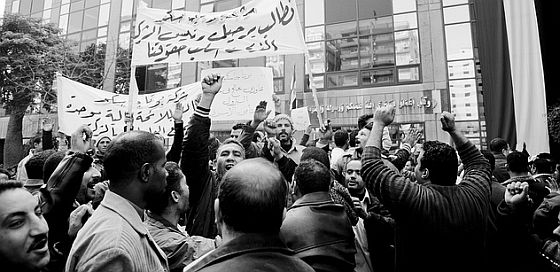The tearful TV appearance of Wael Ghonim, the Google executive who had been held in detention blindfolded for 12 days, had an emotional impact that reverberated across Egypt helping bring the revolution to its climax, but as Frederick Bowie notes, no less decisive — even if it garnered much less media attention — was the impact of labor support for the revolution.
Ghonim’s tears certainly played a crucial role in bringing many people, particularly middle-class Egyptians, down into the streets last week. But they cannot directly account for the massive wave of labour unrest which erupted in the days that followed, and which may have played the decisive role in transforming the emotions of the protesters into concrete gains.
Labour activists had proclaimed the creation of an independent trade union federation as early as 30 January, and the city of Suez, one of Egypt’s economic lynchpins, was at the heart of the struggle from day one. (Some believe that when all is finally known, it will be Suez too which has paid the heaviest price for its resistance in terms of dead and injured.) But the initial call for a general strike seemed at first not to find an echo outside one or two areas of the country. And it was not until as late as the middle of last week, when 24,000 workers at the Mahalla Textile Company downed tools, that labour seemed to throw its full weight behind the revolution.
Mahalla has been the epicentre of industrial action in Egypt for much of the last decade, and once the textile workers there had called a strike, it was not long before action spread to encompass armaments factories, public transport networks, universities and hospitals, oil companies, even the actors’ syndicate.
Continuing what has been the hallmark of recent Egyptian labour activism, these actions combined bread-and-butter demands about working conditions and living standards, with attacks on corruption in both management and the official trades unions, and more explicitly political calls for the end of the regime and expressions of solidarity with the protesters in Tahrir Square.
These strikes build on a recent history of labour activism that has grown since the early 2000s to be the most vibrant force for change in Egypt. Driven by the drastic deterioration in the living and working conditions of the majority of the Egyptian people that followed the regime’s compliance with IMF and World Bank demands for the privatization of state-controlled enterprises, the last decade has seen a constantly rising tide of grassroots workplace actions. And as that movement has spread and grown in confidence, its demands have become more and more explicitly political. As Mahalla strike leader Muhammad al-’Attar told a rally in September 2007, “I want the whole government to resign…. I want the Mubarak regime to come to an end. Politics and workers’ rights are inseparable. Work is politics by itself. What we are witnessing here right now, this is as democratic as it gets.”
For Egypt’s workers, the revolution is not just about an image or an emotion. It is about concrete demands, based on their concrete experience of what it is like to go without food, to be unable to pay for their children’s education, and to witness at first hand the corruption that illicitly breeds obscene levels of wealth. And it is rooted in their experience of mounting countless “illegal” actions that have united their communities, built bridges with other forces within Egyptian society, and demonstrated many times over how sheer force of numbers could overwhelm the repressive apparatus of a regime that was looking increasingly neurotic and out-of-touch.
It is too soon to know what exactly tipped the balance at the end of last week, and convinced the Supreme Council of the Armed Forces that the political and institutional superstructure of the Mubarak regime was now a liability, rather than an asset. But it is hard not to subscribe to the implications of one tweet sent by Egyptian microblogger Hossam el-Hamalawy (aka 3arabawy), which seemed to chime immediately with the hopes of many other cyber revolutionaries:
“#EgyWorkers strikes have started. The organized working class is now entering the arena. Mubarak, u r properly fucked.”



Seems as though the revolution was quite a bit more organized than anyone thought. As time goes on, we are learning more and more. What I’m finding interesting, is the parallels here in the U.S. concerning the labor situation. Of course, the plutocracy here won’t take heed, they will just continue on their merry course.
This made me think about the angles between labor and the army.
The Egyptian military has a piece of almost every industry in Egypt from arg, to transportation to manufacturing appliances to owing luxury hotels and tourism….and not by way of payoff… in actual ownership stakes.
A very unsual set up– that came about from having such a large army and nothing for it members to actually do once they had no wars to fight..so it went to work in the business sector…became workers and the military command became stakeholders.
“If” things do not go as the people wish, the power of labor strikes and their power to improvish the military’s business holdings gives them a huge club to wield if either the military or Mubarak left overs don’t follow thru on the Egyptians demands.